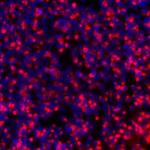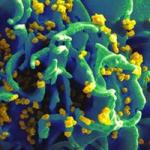
Avindra Nath, M.D.
Senior Investigator
Section of Infections of the Nervous System
NINDS
Clinical Director
NINDS
Research Topics
Neuropathogenesis of HIV infection : HIV reservoirs get established in the brain early during infection and current antiretroviral therapy does not impact the size of the reservoir. Our laboratory is focused on characterizing the virus in the brain by studying the mechanisms by which the virus enters glial cells and persists for extended periods of time. We have shown that the HIV-Tat protein is produced in the brain despite adequate antiretroviral therapy, hence we are trying understand its role in HIV pathogenesis and in developing means to block its effects. This is being accomplished by studying biological samples from a well characterized cohort of HIV-infected individuals and novel in vitro techniques for viral isolation and assays for viral protein detection and monitoring immune function in spinal fluid.
Role of endogenous retroviruses in neurological diseases : Retroviral sequences remain dormant in the human genome and occupy nearly 7-8% of the genomic sequence. We have shown that one of these viruses termed HERV-K (HML-2) is activated in patients with amyotrophic lateral sclerosis (ALS), and transgenic animals that express the envelope protein of HERV-K develop ALS like symptoms. Hence, we are now using a wide variety of in vitro, and in vivo studies to determine the mechanism by which its expression is regulated and causes neurotoxicity to motor neurons. We are also developing new antiviral compounds and molecular techniques for blocking HERV-K.
Undiagnosed Neuroimmune and neuroinfectious diseases : Undiagnosed neuroinflammatory diseases carry a huge burden with devastating consequences. In collaboration with other researchers in NINDS and other institutes, we are investigating these patients and developing new diagnostic methods and modes of treatment for these diseases. An example of which is our observation that patients with Nodding syndrome have autoantibodies to a newly discovered protein in the brain, liemodin-1, caused by a molecular mimicry with a protein in a parasite, onchocerca.
Biography
Selected Publications
- Wang T, Medynets M, Johnson KR, Doucet-O'Hare TT, DiSanza B, Li W, Xu Y, Bagnell A, Tyagi R, Sampson K, Malik N, Steiner J, Hadegan A, Kowalak J, O'Malley J, Maric D, Nath A. Regulation of stem cell function and neuronal differentiation by HERV-K via mTOR pathway. Proc Natl Acad Sci U S A. 2020;117(30):17842-17853.
- Li W, Lee MH, Henderson L, Tyagi R, Bachani M, Steiner J, Campanac E, Hoffman DA, von Geldern G, Johnson K, Maric D, Morris HD, Lentz M, Pak K, Mammen A, Ostrow L, Rothstein J, Nath A. Human endogenous retrovirus-K contributes to motor neuron disease. Sci Transl Med. 2015;7(307):307ra153.
- Li GH, Maric D, Major EO, Nath A. Productive HIV infection in astrocytes can be established via a non-classical mechanism. AIDS. 2020.
- Henderson LJ, Johnson TP, Smith BR, Reoma LB, Santamaria UA, Bachani M, Demarino C, Barclay RA, Snow J, Sacktor N, Mcarthur J, Letendre S, Steiner J, Kashanchi F, Nath A. Presence of Tat and transactivation response element in spinal fluid despite antiretroviral therapy. AIDS. 2019;33 Suppl 2:S145-S157.
- Cortese I, Muranski P, Enose-Akahata Y, Ha SK, Smith B, Monaco M, Ryschkewitsch C, Major EO, Ohayon J, Schindler MK, Beck E, Reoma LB, Jacobson S, Reich DS, Nath A. Pembrolizumab Treatment for Progressive Multifocal Leukoencephalopathy. N Engl J Med. 2019;380(17):1597-1605.
Related Scientific Focus Areas




Microbiology and Infectious Diseases
View additional Principal Investigators in Microbiology and Infectious Diseases

This page was last updated on Wednesday, May 28, 2025